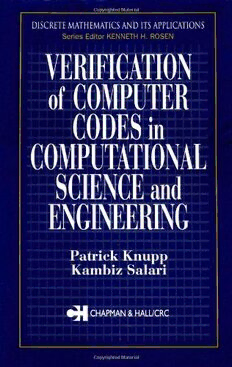Download Verification of Computer Codes in Computational Science and Engineering PDF Free - Full Version
Download Verification of Computer Codes in Computational Science and Engineering by Patrick Knupp, Kambiz Salari in PDF format completely FREE. No registration required, no payment needed. Get instant access to this valuable resource on PDFdrive.to!
About Verification of Computer Codes in Computational Science and Engineering
How can one be assured that computer codes that solve differential equations are correct? Standard practice using benchmark testing no longer provides full coverage because today's production codes solve more complex equations using more powerful algorithms. By verifying the order-of-accuracy of the numerical algorithm implemented in the code, one can detect most any coding mistake that would prevent correct solutions from being computed. Verification of Computer Codes in Computational Science and Engineering sets forth a powerful alternative called OVMSP: Order-Verification via the Manufactured Solution Procedure. This procedure has two primary components: using the Method of Manufactured Exact Solutions to create analytic solutions to the fully-general differential equations solved by the code and using grid convergence studies to confirm the order-of-accuracy. The authors present a step-by-step procedural guide to OVMSP implementation and demonstrate its effectiveness. Properly implemented, OVMSP offers an exciting opportunity to identify virtually all coding 'bugs' that prevent correct solution of the governing partial differential equations. Verification of Computer Codes in Computational Science and Engineering shows you how this can be done. The treatment is clear, concise, and suitable both for developers of production quality simulation software and as a reference for computational science and engineering professionals.
Detailed Information
| Author: | Patrick Knupp, Kambiz Salari |
|---|---|
| Publication Year: | 2002 |
| ISBN: | 9781420035421 |
| Pages: | 161 |
| Language: | English |
| File Size: | 2.099 |
| Format: | |
| Price: | FREE |
Safe & Secure Download - No registration required
Why Choose PDFdrive for Your Free Verification of Computer Codes in Computational Science and Engineering Download?
- 100% Free: No hidden fees or subscriptions required for one book every day.
- No Registration: Immediate access is available without creating accounts for one book every day.
- Safe and Secure: Clean downloads without malware or viruses
- Multiple Formats: PDF, MOBI, Mpub,... optimized for all devices
- Educational Resource: Supporting knowledge sharing and learning
Frequently Asked Questions
Is it really free to download Verification of Computer Codes in Computational Science and Engineering PDF?
Yes, on https://PDFdrive.to you can download Verification of Computer Codes in Computational Science and Engineering by Patrick Knupp, Kambiz Salari completely free. We don't require any payment, subscription, or registration to access this PDF file. For 3 books every day.
How can I read Verification of Computer Codes in Computational Science and Engineering on my mobile device?
After downloading Verification of Computer Codes in Computational Science and Engineering PDF, you can open it with any PDF reader app on your phone or tablet. We recommend using Adobe Acrobat Reader, Apple Books, or Google Play Books for the best reading experience.
Is this the full version of Verification of Computer Codes in Computational Science and Engineering?
Yes, this is the complete PDF version of Verification of Computer Codes in Computational Science and Engineering by Patrick Knupp, Kambiz Salari. You will be able to read the entire content as in the printed version without missing any pages.
Is it legal to download Verification of Computer Codes in Computational Science and Engineering PDF for free?
https://PDFdrive.to provides links to free educational resources available online. We do not store any files on our servers. Please be aware of copyright laws in your country before downloading.
The materials shared are intended for research, educational, and personal use in accordance with fair use principles.

